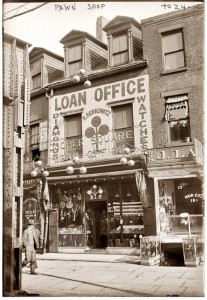 Pawn lending is a old business and the industry itself has been around for years.
Pawn lending is a old business and the industry itself has been around for years.
A pawnbroker is an individual or business (pawnshop or pawn shop) that offers secured loans to people, with items of personal property used as collateral.
The word pawn is derived from the Latin pignus, forpledge, and the items having been pawned to the broker are themselves called pledges or pawns, or simply the collateral. Some reports trace pawn loans back at least 3,000 years to ancient China, Greece and Rome.
For thousands of years pawning has long been a source of capital for individuals, as well as a way to finance new business ventures.
According to the National Pawnbrokers Association, even Queen Isabella of Spain pawned her royal jewels to finance Christopher Columbus’ voyage to the New World.
And during the Middle Ages, certain usury laws imposed by the Church prohibited interest from being charged on loans, thereby limiting pawnbroking to people outside of the Church. Out of necessity pawnshops became popular again and the fundamentals of the pawn business remain unchanged.
